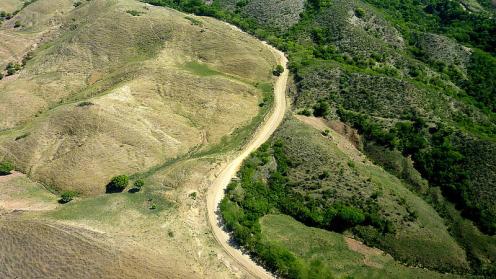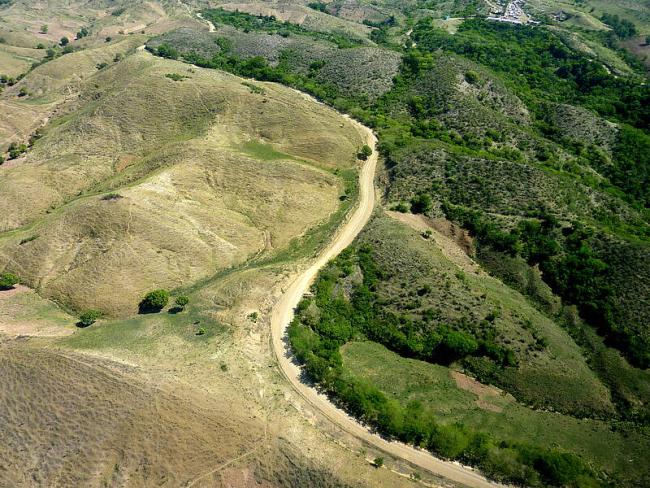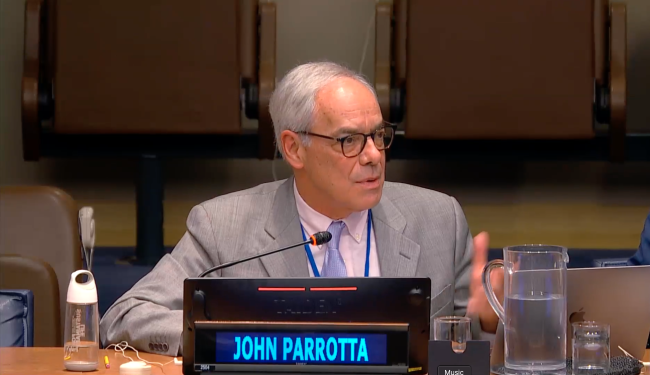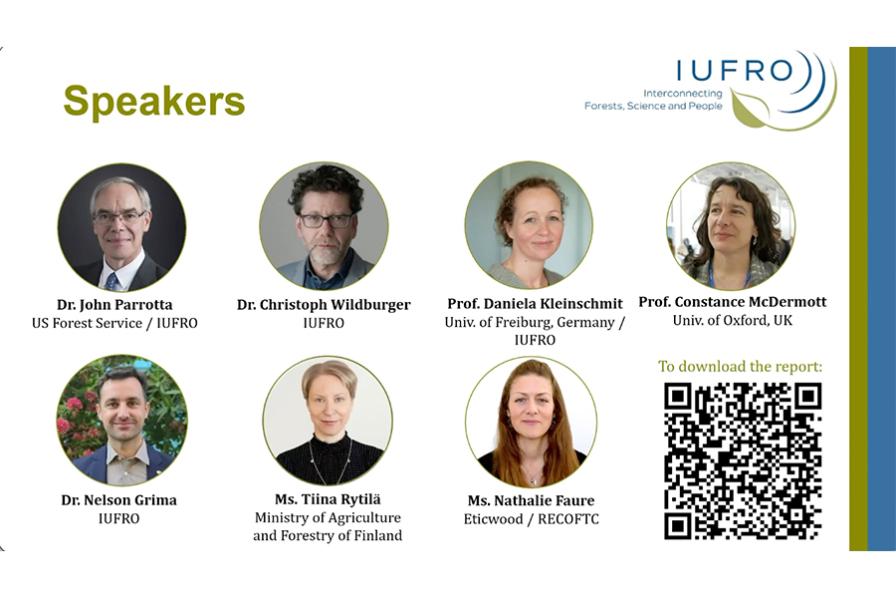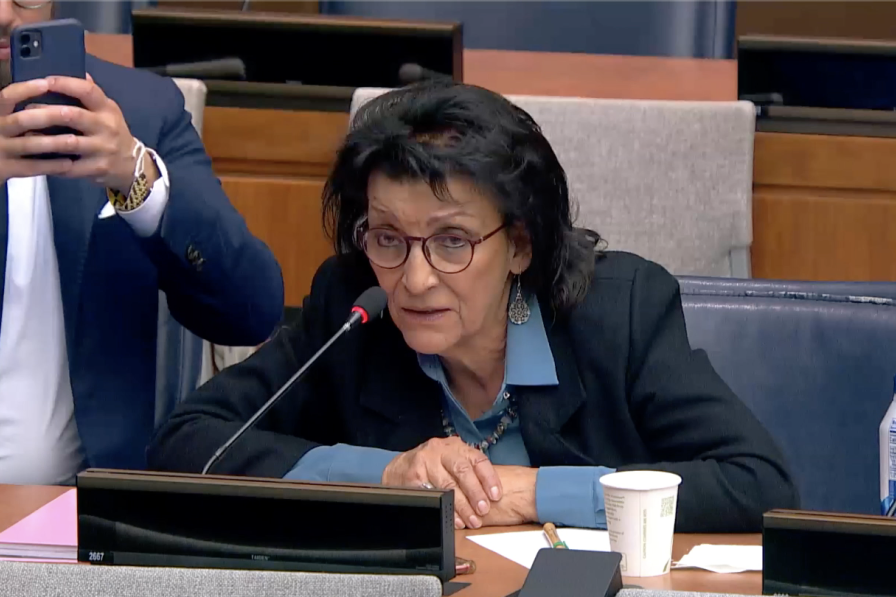About
A side event organized by the International Union of Forest Research Organizations (IUFRO), held during the 19th session of the United Nations Forum on Forests (UNFF19), launched the publication of the first global synthesis report on international forest governance in 14 years.
Forests cover one-third of the Earth’s landmass. These ecosystems represent significant economic value and hold vast intrinsic and aesthetic worth. Despite progress made in reducing global deforestation rates through international forest governance mechanisms, forests remain threatened by climate change, biodiversity loss, and increasing social and economic inequalities.
This event, held during UNFF19 and organized by IUFRO, launched the publication of International Forest Governance: A critical review of trends, drawbacks, and new approaches. The new report analyzes developments in international forest governance since 2010, when the IUFRO-led Global Forest Expert Panel (GFEP) published its last global assessment. The side event highlighted pivotal developments in international forest governance, as summarized by the report’s authors, and featured reactions to the report from stakeholders and a question-and-answer session.
Opening Remarks
In welcome remarks, John Parrotta, US Forest Service and IUFRO President, expressed hope that the report would inform evidence-based decision making at UNFF19 and beyond. The event was then introduced by Christoph Wildburger, IUFRO Science-Policy Programme, who noted that the 2010 report had described the international forest governance landscape as “complex and fragmented,” and since that time, the number of actors, initiatives, arrangements, and institutions has “increased considerably.” He said the new report analyzes trends and challenges since 2010, and potential approaches for improving forest governance in the future. He introduced two of the report’s authors, Daniela Kleinschmit and Constance McDermott, to summarize its findings.
Report Presentation by the Authors
Daniela Kleinschmit, University of Freiburg, Germany, acknowledged the contributions of 38 authors, four editors, and eight reviewers to the report. She clarified that “international forest governance” refers to the formal and informal sets of rules and relationships that define and regulate state and non-state actors in international forest affairs. She reviewed various layers of discourses that have been used to understand forest systems and guide decision-making over forests, from the market-focused “ecological modernization” discourse, with a neoliberal framing of forests as carbon sinks, to the more justice-focused “forest-related traditional knowledge” discourse, which views local communities and Indigenous Peoples as conservationists and forests as “cultured spaces.” She noted that “problem solving” approaches to international forest governance focus on fixing specific challenges within a generally accepted overarching system, while more radical critiques call for changes that “uncover underlying power asymmetries and conflicts.”
Regarding the fragmentation in forest regulations that persists across international, regional, national, and sub-national levels, Kleinschmit said the solutions identified in the 2010 report “were still appropriate, but still not achieved.” She highlighted the new report’s more “people-centered” approach to improving international forest governance, with a focus on making it more inclusive, and on connecting and coordinating existing instruments. She also called for more discussion of degrowth in international forest governance, which is not about “planting trees and ending deforestation, but [rather about] reducing consumption and production." She concluded by urging those attending the event to embrace people-centered approaches to international forest governance over “simplified standards of success” like deforestation rates. “It’s easier to talk about figures and numbers versus qualitative issues like justice and fairness,” she noted, “but we’re capable.”
Constance McDermott, University of Oxford, UK, appeared via video recording and highlighted several key trends identified in the report. These included the “Target Olympics” of ever-expanding quantitative pledges to reduce deforestation, “even as existing targets fail to be met,” and the increasing “climatization” of forests, in which a narrow focus on these ecosystems as carbon sinks “potentially obscures” their other social and ecological values.
On the increasing financialization of forests, McDermott underscored the “mixed and inconclusive evidence” for the effectiveness of programmes like REDD+ (Reducing emissions from deforestation and forest degradation, plus the role of conservation, sustainable management of forests, and enhancement of forest carbon stocks in developing countries). She further stressed that market-based approaches can reinforce inequalities, citing the example of Ghanian cocoa farmers, who lack secure land rights and the capacity to meet the proliferation of formalized environmental standards, resulting in local and domestic livelihoods being increasingly excluded from markets. She called for more emphasis on “ground-up and inclusive strategies” in international forest governance, especially where forest finance is concerned. Solving these problems is not simply a matter of “more money and faster,” McDermott said, but of “going more slowly and steadily and carefully.”
Stakeholder Statements and Q&A
Nelson Grima, IUFRO Science-Policy Programme, introduced two stakeholders involved in forest governance and asked for their insights on the report from the perspective of policymaking.
Tiina Rytilä, Ministry of Agriculture and Forestry of Finland, highlighted the important partnership between IUFRO and Finnish scientific institutions, and praised IUFRO for its work in supporting sustainable forestry and livelihoods around the world. She lauded the peer-reviewed report for addressing a “vacuum” in international forest governance, explaining that the report recognizes that forests are not only important for climate mitigation and adaptation, but also for long-term marked-based investments and the sustainable future of the communities depending on them.
Nathalie Faure, EticWood/Regional Community Forestry Training Center for Asia and the Pacific, discussed multiple levels of forest governance, from the global to regional scales, from a policymaking perspective. Among the trends she highlighted were: a growing focus on the social dimensions of forests; the increased participatory design of governance processes; and a shift in market focus from the legality of forest products to their sustainability. She lauded the EU Forest Law Enforcement, Governance, and Trade Voluntary Partnership Agreements approach of bringing civil society and the private sector together at negotiating tables, enabling a series of legislative reforms in terms of land use and the rights of Indigenous and local communities. She noted the key challenge with such programmes is setting up traceability and monitoring systems to make them effective. Adding that “one country and one actor cannot do it all,” she called for multiple solutions to complex deforestation issues, embedded in and adapted to local and regional contexts.
The event concluded with a question-and-answer session focused on topics such as: harmonizing the regulatory landscape for forests at both national and subnational levels, since many governments consider forest issues across at least two ministries; the extent to which the fate of forests depends on forest-specific governance versus forces outside the forest sector; the underlying causes of deforestation; and the distinctions between forestry governance, forest governance, and forests in general.
Organizer: IUFRO
Contact: Gerda Wolfrum | wolfrum@iufro.org
For more information: https://www.iufro.org/science/science-policy/follow-up-studies/international-forest-governance-2024/outreach-and-media/
The Earth Negotiations Bulletin (ENB) writer for this meeting is Kate Harris. The Digital Editor is Diego Noguera. The Editor is Leila Mead.
Funding for coverage of this is event has been provided by IUFRO.
To receive free coverage of global environmental events delivered to your inbox, subscribe to the ENB Update newsletter.
